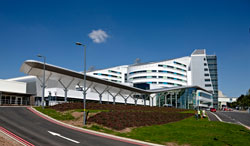Midlands leading the revolution
A revolution in the drug discovery industry is underway, with universities across the West Midlands leading the effort by working in partnership with industry to focus on improving patient care.
Ninety academic and business leaders converge at Science Capital’s Innovative Healthcare event on September 21 to showcase investment propositions and build on successes of translating medical research into clinical practice.
The plans being presented range from smart robots for the inner ear of the profoundly deaf being designed at University Hospitals Birmingham to therapeutic boots for healing foot ulcers from The Diabetic Boot Company.
Professor Paul Moss at the University of Birmingham is aiming to improve how the body’s immune system functions in order to prevent and treat infection and cancer.
Bio-chips are being developed with functionalised surfaces to detect tuberculosis and a range of other diseases at the National Physical Laboratory, showing how fundamental technology can be adapted for a multitude of uses.
Practical solutions that could offer immediate benefits to patients include remote monitoring systems for children and the elderly being developed at Birmingham Childrens Hospital, McLaren Electronics and MDTi, and reduce the burden on healthcare resources in order to target expenditure more equitably.
The Binding Site is leading the pack. This home-grown biotech is developing diagnostic tests for millions of cancer and immunocompromised patients each year, with Charles de Rohan, CEO, unveiling plans to further expand the company’s global reach.
Birmingham’s commitment to providing the best in patient care is exemplified by the Leukaemia Centre at University Hospitals Birmingham. Under Professor Charles Craddock the centre has attracted £12 million of new drugs from pharmaceutical companies, created a hundred jobs and launched a national clinical trials network. Discussions are now underway with the Greater Birmingham Local Enterprise Partnership to provide a similarly high level of care for a much wider range of conditions.
Demand for the latest healthcare technology is increasing thanks to an aging population and increasingly competitive market, and large and small industrial players are ramping up production.
Handheld scanners that see cancers lurking beneath the skin are being developed by Gordon McKenzie’s team at Michelson Diagnostics. The devices are already proving popular with doctors in the USA for early detection of non-melanoma skin cancers.
Trials of Chemex International’s new approach to combating superbugs in NHS Trusts have proven successful, leading to growing demand for the environmentally friendly and inexpensive technology for keeping hospitals safe according to Scientific Director Sean Derrig.
According to Michael Overduin, CEO of Science Capital, this is the right time to invest in building up translational research capacity to deliver better patient care. This is potentially our region’s fastest growing sector, with thousands of research teams and companies looking to meet global demand for new therapeutic and diagnostic systems to improve how we detect and treat medical conditions.
(appeared in the Birmingham Post on 22 Sept 2011)
 Queen Elizabeth Hospital Birmingham
Queen Elizabeth Hospital Birmingham
